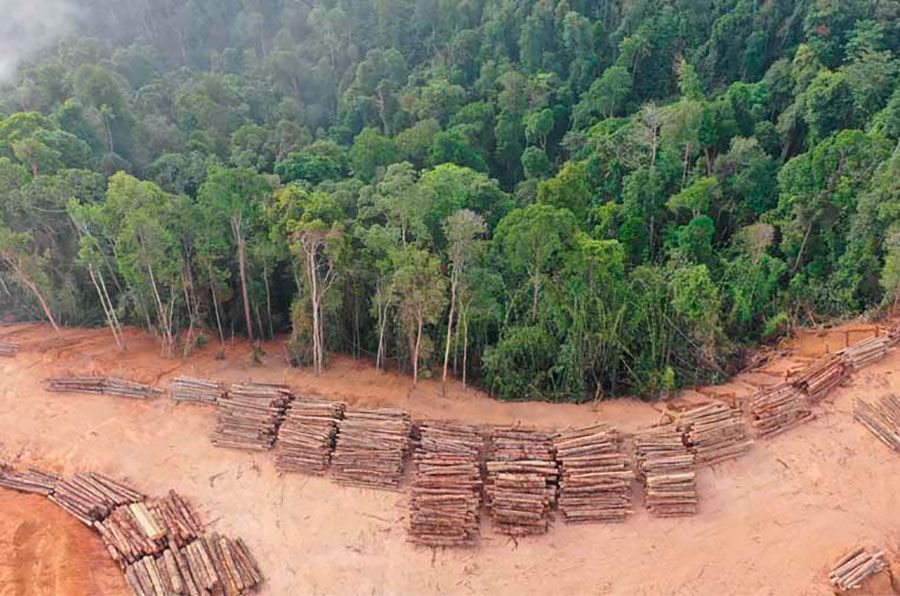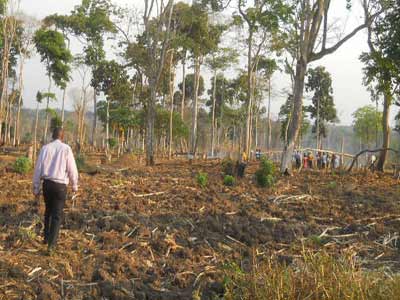- hot-spots
- deforestation
- Nigeria
- Mass deforestation in Ondo State, Nigeria

Problems
Mass deforestation in Ondo State, Nigeria
Cutting down trees for logging, opening farmland, or meeting energy demand for a growing population is putting pressure on Nigeria's natural forests. The 1.14 million hectares of forest can be compared to 587,000,000 tons of carbon dioxide or 11% of the planet's total tree cover. Nigeria has a rich biodiversity that has allowed it to thrive, but in recent years deforestation has been so active that the country is experiencing the highest deforestation rate in the world. With no other sources of construction, fuel, or energy, people are cutting down trees in huge numbers. Local authorities try to provide residents with alternatives for fuel or energy, but they are all many times more expensive, making demand negligible. In addition, Nigerians cut down trees to clear land for farmland, pastures, and vegetable gardens.
Progression of deforestation during the country's independence
Back in the 1950s, large areas of land were set aside as protected areas, but at this point, they don't exist - the forests were destroyed long ago after the country gained independence in 1960 and was able to manage the land itself. As a result, throughout the country's existence, locals have cut down more than 50% of their forests. As a result, the fauna suffers - animals are killed by the hundreds: some lose their home, others lose their food, and others simply have nowhere to hide from hunters.
Attempts to solve the problem
For now, the authorities have been able to provide some regions with cheap kerosene and reduce deforestation there, but this is only the beginning of a huge planned effort to preserve the forests. The other part will be the distribution of solar panels for energy, hydroelectric power stations, and wind generators. For this, the authorities are trying to get funds from the UN and other global conservation organizations.
Gallery
2Timelines
2023
November
There were 15 deforestation alerts reported in Akure North, Ondo State, Nigeria between the 10th of November 2023 and the 17th of November 2023, covering a total of < 1 ha of which none were high confidence alerts detected by a single system and none were alerts detected by multiple systems.
October
There were 128 deforestation alerts reported in Akure North, Ondo State, Nigeria between the 26th of October 2023 and the 2nd of November 2023, covering a total of 2 ha of which none were high confidence alerts detected by a single system and none were alerts detected by multiple systems.
March 30
Nigeria’s federal government has blamed the ongoing deforestation across the country on state governments and other powerful interest groups who protect loggers that produce charcoal for sale. Minister of Environment, Mohammed Abdullahi, who made this known while speaking with newsmen at the State House, Abuja, disclosed that each time the federal government moves against the menace to save the environment, there was pushback at the subnational level on the ground that the trees belong to the states. Answering questions on the felling of trees for charcoal, the Minister said: “No other administration has tackled this issue like the Buhari administration. The challenge we are facing under deforestation and charcoal is engaging the Nigerian Governors Forum because of the Land Use Act. “The federal government is just a policy provider and doesn’t have that control over state government land to work out a modality which Kaduna State government has keyed in properly. Abdullahi further disclosed that the present administration has so far planted five million trees as part of its target to plant 25 million trees by the year 2030 under its afforestation policy. He revealed that National Forestry Trust Funding (NFTF) was established, to drive the National Forestry Investment Programme (NFIP), 2019 – 2023: to the tune of N259,217.09 million, with five key areas of investment support, such as landscape management, forest governance issues, forest information systems capacity building and cross-sectoral issues, identified. “This effort is under the country’s resolve to further enhance conservation activities, increase the amount of forest cover under protective management, improve internal security and ultimately reduce the negative impacts of climate change in line with the UN Sustainable Development Goals and enhance socioeconomic development for the nation.
2021
August 13
From 2001 to 2021, Nigeria lost 1.14 million hectares (2.82 million acres) of tree cover, equivalent to an 11% reduction in tree cover and equal to 587 million tons of carbon dioxide emissions, according to Global Forest Watch, a platform that provides data and monitors forests.
2020
October 17
Nigeria lost 14% of its virgin forests between 2002 and 2020.
2019
November 15
At a climate summit, Nigeria's president promised to plant 25 million trees a year. However, animal advocates say much more needs to be done.
2010
December 20
From 1990 to 2010, Nigeria nearly halved its forest cover, increasing from 17,234 to 9,041 hectares.
2005
October 05
In 2005, Nigeria had the highest deforestation rate in the world according to the Food and Agriculture Organization of the United Nations.
